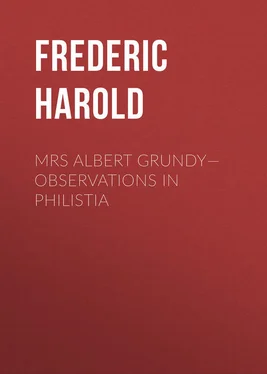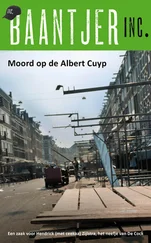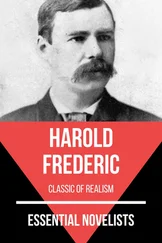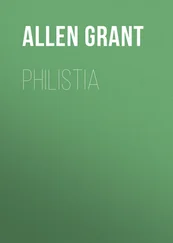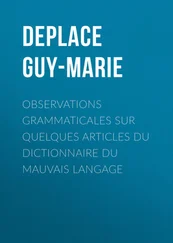Harold Frederic - Mrs Albert Grundy—Observations in Philistia
Здесь есть возможность читать онлайн «Harold Frederic - Mrs Albert Grundy—Observations in Philistia» — ознакомительный отрывок электронной книги совершенно бесплатно, а после прочтения отрывка купить полную версию. В некоторых случаях можно слушать аудио, скачать через торрент в формате fb2 и присутствует краткое содержание. Жанр: foreign_antique, foreign_prose, на английском языке. Описание произведения, (предисловие) а так же отзывы посетителей доступны на портале библиотеки ЛибКат.
- Название:Mrs Albert Grundy—Observations in Philistia
- Автор:
- Жанр:
- Год:неизвестен
- ISBN:нет данных
- Рейтинг книги:5 / 5. Голосов: 1
-
Избранное:Добавить в избранное
- Отзывы:
-
Ваша оценка:
- 100
- 1
- 2
- 3
- 4
- 5
Mrs Albert Grundy—Observations in Philistia: краткое содержание, описание и аннотация
Предлагаем к чтению аннотацию, описание, краткое содержание или предисловие (зависит от того, что написал сам автор книги «Mrs Albert Grundy—Observations in Philistia»). Если вы не нашли необходимую информацию о книге — напишите в комментариях, мы постараемся отыскать её.
Mrs Albert Grundy—Observations in Philistia — читать онлайн ознакомительный отрывок
Ниже представлен текст книги, разбитый по страницам. Система сохранения места последней прочитанной страницы, позволяет с удобством читать онлайн бесплатно книгу «Mrs Albert Grundy—Observations in Philistia», без необходимости каждый раз заново искать на чём Вы остановились. Поставьте закладку, и сможете в любой момент перейти на страницу, на которой закончили чтение.
Интервал:
Закладка:
“I met an old friend of Regnault’s at the Club the other day,” I interposed, “who complained bitterly of that. He said it was insufferable impudence to bring him in at all, and still worse to make him talk such blather as is put into his mouth.”
Mrs Albert sniffed at this Club friend and went on. That Paris part of the book seemed to her to just palpitate with life. It was Paris to the very letter – gay, intellectual, sparkling, and oh! so free! The young Englishman at once set up a romantic establishment in the heart of Fontainebleau Forest with a French painter-girl. His sister was almost as promptly debauched by an elderly French sculptor. But you never lost sight of the fact that the author was teaching a valuable moral lesson by all this. Indeed, that whole part of the book was called “Storm and Stress.” And all the while you saw, too, how innately superior the national character of the young Englishman was to that of the French people about him. One knew that in good time he would have a moral awakening, and return to England, marry, settle down, and make money in his business. Side by side with this you saw the entire hopelessness of any spiritual regeneration in the French painter-girl or any of her artistic set. And this was shown with such delicate art – it was so perfect a picture of the moral contrast between the two nations – that the girls saw it at once.
“Then the girls,” I put in – “that is to say, you didn’t lock this book up?”
Mrs Albert lifted her eyebrows at me.
“How do you mean?” she asked. “Do you know who the author is? The idea! Why, the papers print whole columns about anything she writes. Every day you may see paragraphs about the mere prospect of books she hasn’t even begun yet. I suppose such blatant publicity must be very distressing to her, but the public simply insist upon it. The Daily Tarradiddle devoted an entire leader to this particular book. I assure you, all my friends are talking of nothing else – many of them people, too, whom you would not suspect of any literary tastes whatever, and who never read novels as a rule. But they don’t regard this as a novel. They think of it – I quote Lady Willoughby Wallaby’s exact words – as an exposition of those Christian principles which make our England what it is.”
Setting forth the Untoward Circumstances under which the Right Tale was Unfolded in the Wrong Company
Much has been written about that variety of “cab-wit” which occurs to a man on his way home from dinner: the brilliant sallies he might have made, the smart retorts which would so bravely have reversed the balance of laughter had they only come in time. We are less frank about the other sort. No one dwells in type upon the manner in which we marshal our old jokes and arrange our epigrams as we drive along to the house of feasting.
No doubt the practice of getting up table-talk is going out. The three-bottle men took it to the grave with them, along with the snuff-box, and the toupee, and the feather-bed, and other amenities of the Regency. There never was but one diner-out in the London of my knowledge who was at pains to prepare his conversations, each for its special occasion and audience, and he, poor man, broke down under the strain and disappeared from view. The others are too lazy, too indifferent, too cocksure of themselves, to go to all this bother. The old courtly sense of responsibility to the host is perished from among them. But none the less, the least dutiful and diligent of all their number does ask himself questions as the whirling rubber tyres bear him onward, and the cab-mirror shows him the face of a man to whom people ought to listen.
The question I asked myself, as I drove past the flaring shop windows of Old Brompton Road the other evening, was whether the Grundys would probably like my story of Nate Salsbury and the Citizen of South Bend, Indiana. A good deal depended upon the decision. It was a story which had greatly solidified my position in other hospitable quarters; it could be brought in apropos of almost anything, or for that matter of quite nothing at all; it had never been printed, so far as I know, in any of those American comic papers which supply alike the dining-rooms of Mayfair and the editorial offices of Fleet Street with such humour as they come into possession of; and I enjoyed telling it. On the other hand, the Grundys were old friends of mine, who would never suspect that they had missed anything if I preserved silence on the subject of South Bend, and who would go on asking me to dinner whether I told new tales or not; moreover, their attitude towards fresh jokes was always a precarious quantity, and I had an uneasy feeling that if I told my story to them and it failed to come off, so to speak, I should never have the same confidence in it again.
When I had entered the drawing-room of Fernbank, shaken hands with Mrs Albert Grundy and Ermyntrude, and stolen a little glance about the circle as I walked over to the fireplace, it had become clear that the story was not to be told. Beside the half-dozen of the family, including the curate, there was a tall young man with a very high collar, shoulders that sloped down like a Rhine-wine bottle, and a stern expression of countenance. Uncle Dudley whispered to me, as we held our hands over the asbestos, that he was a literary party, and the son of old Sir Watkyn Hump, who was a director in one of Albert’s companies. The other guests were a stout and motherly lady in a cap and a purplish smile, and a darkling young woman with a black velvet riband around her thin neck, and a look of wearied indifference upon her face. This effect of utter boredom did not visibly diminish upon my being presented to Miss Wallaby.
I have an extremely well-turned little brace of sentences with which to convey the intelligence to a young lady that the honour of taking her down to dinner has fallen upon me – sentences which combine professions of admiring pleasure with just a grateful dash of respectful playfulness; they brought no new light into Miss Wallaby’s somewhat scornful pince-nez . Decidedly I would not tell my South Bend story that night!
But all the same I did. What led up to it I hardly know. It was at the ptarmigan stage, I remember – or was it a capercailzie? – and young Mr Hump had commented upon the great joy of living in England, where one could enjoy delicious game all the year round, instead of in a country like America, where the inhabitants notoriously had nothing but fried salt pork to eat for many months at a time. Perhaps it was not worth while, but I ventured the correcting remark that there was no season of the year when one couldn’t have eighteen edible varieties of wild birds in America for every one that England has ever heard of. Mr Hump preened his chin about on the summit of his collar and smiled with superior incredulity. The others looked grave. Mrs Grundy whispered to me warningly, over her left shoulder, that Mr Hump had made America his special subject, and wrote most vigorous and comminatory articles about it almost every week. I was painfully conscious that Miss Wallaby’s cold right shoulder had been still further withdrawn from me.
Well, it was at this grotesquely inauspicious moment that I told my story. It is easy enough now to see that it was sheer folly, madness if you like, to do so. I was only too bitterly conscious of that when I reviewed the events of the evening in my homeward cab. It was apropos of nothing under the wide sky. But at the moment, I suppose, I hoped that it would relieve the situation. In one sense it did.
Baldly summarised, this is the tale. Years ago the admirable Nate Salsbury was on a “one-night-stand” tour with his bright little company of comedians through the least urban districts of Indiana, and came upon South Bend, which is an important centre of the wagon-making industry, but is not precisely a focussing point of dramatic traditions and culture.
Читать дальшеИнтервал:
Закладка:
Похожие книги на «Mrs Albert Grundy—Observations in Philistia»
Представляем Вашему вниманию похожие книги на «Mrs Albert Grundy—Observations in Philistia» списком для выбора. Мы отобрали схожую по названию и смыслу литературу в надежде предоставить читателям больше вариантов отыскать новые, интересные, ещё непрочитанные произведения.
Обсуждение, отзывы о книге «Mrs Albert Grundy—Observations in Philistia» и просто собственные мнения читателей. Оставьте ваши комментарии, напишите, что Вы думаете о произведении, его смысле или главных героях. Укажите что конкретно понравилось, а что нет, и почему Вы так считаете.
